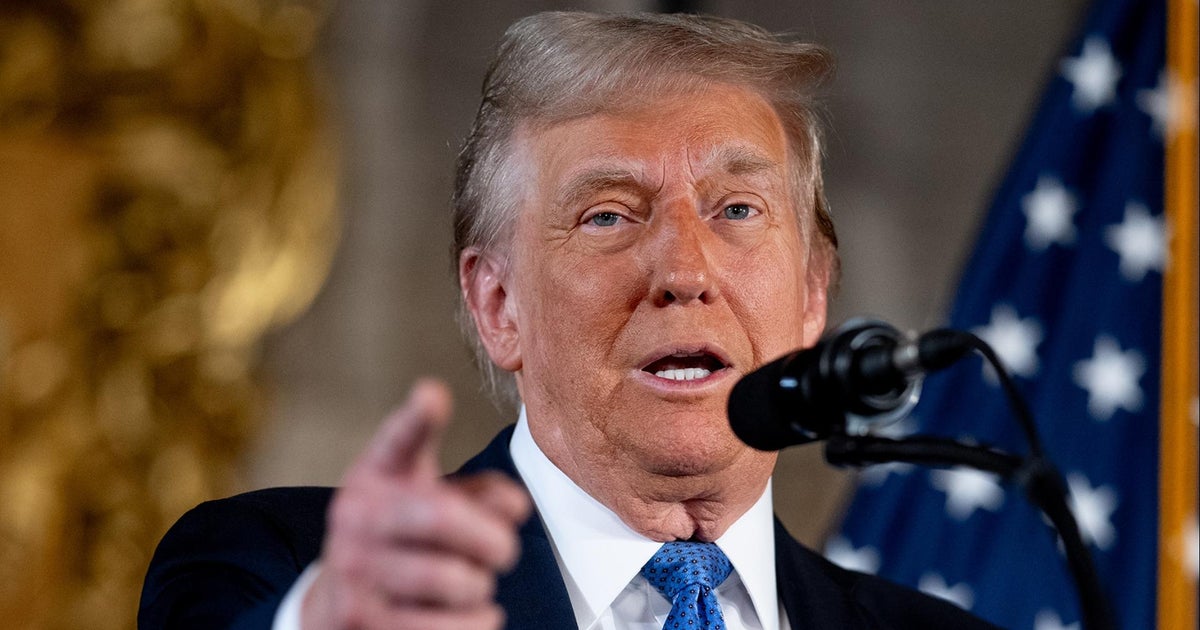The state of the facts on Trump's foreign policy
If his first State of the Union address last year is any guide, President Trump is likely to spend more time talking about domestic policy than foreign policy. Still, the administration faces a number of foreign policy challenges from Syria and Iran to Venezuela.
Here are some of the things to know about U.S. foreign policy going into the State of the Union address on Tuesday night.
Has Iran been complying with the nuclear deal?
After demanding a better deal for the United States, Mr. Trump in May officially withdrew the U.S. from the 2015 international Iran nuclear deal, formally known as the Joint Comprehensive Plan of Action. "This was a horrible, one-sided deal that should have never, ever been made," he said of the pact, which lifted harsh economic sanctions on Iran in exchange for the regime's promise to restrict its nuclear program for at least a decade.
However, the president's intelligence officials said Iran is generally complying with the nuclear deal, even as Iranian officials have threatened to push the boundaries of the deal.
"We do not believe Iran is currently undertaking activities we judge necessary to produce a nuclear device," Director of National Intelligence Dan Coats said in testimony on Capitol Hill last week.
The International Atomic Energy Agency also concluded last year that Iran is generally complying with the deal although it also concluded Iranian officials could do more to work with inspectors to boost confidence in its commitment.
But Mr. Trump refuted his own intelligence chiefs, telling CBS' "Face the Nation" in an interview last week he disagrees with them on the threat Iran poses, "100 percent."
"My intelligence people, if they said in fact that Iran is a wonderful kindergarten, I disagree with them 100 percent. It is a vicious country that kills many people," he said.
Does North Korea still pose a threat to the U.S.?
Mr. Trump claimed last year that North Korea was no longer a threat. But a January missile defense assessment from the Pentagon said North Korea still poses an "extraordinary threat," and the president's own top intelligence officials testified on Capitol Hill last week that North Korea shouldn't be ignored.
Mr. Trump has also pointed to North Korea's lack of missile tests since his June meeting with North Korean leader Kim Jong Un as evidence of success with North Korea, but North Korean Foreign Minister Ri Yong Ho told the United Nations General Assembly in October there was "no way" North Korea would disarm its weapons if it can't trust Washington. And Coats testified last week it was unlikely North Korea will ever denuclearize.
The president and Kim are expected to meet for their second summit at the end of February.
Is the U.S. willing to increase its intervention in Venezuela?
In late January, the Trump administration recognized National Assembly President Juan Guaidó as Venezuela's interim president, issued sweeping sanctions against the largest state-owned oil company in the South American country and offered $20 million in humanitarian aid to the Venezuelan people. The White House has urged President Nicolás Maduro, whose re-election in 2018 the administration considers to be illegitimate, to relinquish power. The U.S., which was the first nation to recognize Guaidó, has held out the threat of further action against Maduro -- administration officials have repeatedly said "all options are on the table."
Mr. Trump's crackdown against Maduro's increasingly authoritarian government has garnered rare bipartisan support in Congress. Some progressive lawmakers, however, have expressed concern about the U.S. meddling in a foreign political dispute and imposing crippling sanctions that could harm a Venezuelan population already grappling with widespread food and medicine shortages.
Afghanistan: U.S. troop withdrawal raises concern about Taliban
Last week, Zalmay Khalilzad, the top U.S. envoy in Afghanistan, said his diplomatic team agreed to a "draft of the framework" for a peace process with the Taliban. But important details in an agreement to end America's longest-running war still need to be fleshed out, and officials in Washington and Kabul have expressed concern about the withdrawal of U.S. troops without significant concessions from the insurgents or an assurance of peace.
Senior defense officials told CBS News in late December that the White House ordered the Pentagon to start planning a major drawdown of roughly 7,000 troops in Afghanistan fighting the Taliban insurgency. As is the case in Syria, Mr. Trump has not been quiet about his opposition to American involvement in Afghanistan, and he's recently suggested the Taliban has been forced to the negotiating table.
"I inherited a total mess in Syria and Afghanistan, the 'Endless Wars' of unlimited spending and death. During my campaign I said, very strongly, that these wars must finally end. We spend $50 Billion a year in Afghanistan and have hit them so hard that we are now talking peace…" the president recently tweeted.
But some officials have rejected the notion that Afghanistan is on the verge of peace. The U.S. government's special inspector general for Afghanistan reconstruction, an Afghan war watchdog, reported to Congress on Thursday that the Afghan government actually lost territory during the last year.
Iraq and Syria: ISIS may have lost territory, but the group could re-emerge
The White House in December ordered the Pentagon to withdraw U.S. forces from Syria, with Mr. Trump all but declaring that the Islamic State of Iraq and Syria, or ISIS, was defeated and, therefore, there was no reason for troops to be in the region. Mr. Trump told CBS' "Face the Nation" recently that 2,000 troops currently remain in Syria, but they are starting to come home as they push out the "final remainder of the caliphate."
The Department of Defense, however, believes that "absent sustained pressure" on ISIS the group could re-emerge in Syria within six to 12 months.
Congress has yet to approve Trump's NAFTA redo
Last November, the United States, Mexico and Canada signed the United States-Mexico-Canada Agreement — or USMCA — to replace NAFTA. The legislative branches of all three governments still need to ratify the deal.
If ratified, the trilateral agreement would open up the Canadian dairy market to American farmers, extend intellectual property protections and require that 40 to 45 percent of automobile parts be manufactured by workers who earn at least $16 per hour by 2023. Additionally, cars would need to have 75 percent of their components made in the United States, Mexico or Canada to be eligible for zero tariffs.
Despite the agreement not being ratified, the president has insisted Mexico is paying for his border wall — many times over — through the agreement.
"Mexico is paying for the Wall through the new USMCA Trade Deal," the president tweeted last month.
The White House hasn't specified exactly how the trade agreement would reimburse American taxpayers.
The "remain in Mexico" asylum policy debuted last week
Last week, the Trump administration officially launched a far-reaching policy to overhaul the asylum system by requiring certain non-Mexican migrants who cross the southern border to wait in Mexico while their asylum requests are processed in American courts. Under the policy, officially dubbed "Migration Protection Protocols," U.S. immigration authorities have started turning away asylum-seekers at the San Ysidro Port of Entry in San Diego.
The Mexican government said it does not agree with the "unilateral" measure by the U.S. government, but vowed to uphold its commitment to migrants and human rights.
The Trump administration is expected to expand the policy to other areas of the southern border — but the practice is also likely to be challenged in court.
Has Trump really been "tougher" on Moscow than any other president?
To denounce special Robert Mueller's far-reaching investigation into Russian meddling in U.S. elections and possible coordination between Trump campaign associates and the Kremlin, President Trump has repeatedly portrayed his administration's stance towards Russia as a tough and aggressive one. "I have been tougher on Russia than any president, maybe ever," the president told "Face the Nation" Sunday.
His claims represent a salient departure from his multiple calls on the campaign trail for the U.S. to have warmer relations with Russia and President Vladimir Putin, a strongman who Mr. Trump has praised on numerous occasions. In a remarkable press conference last summer after meeting one-on-one with Putin for more than two hours — a first for an American president — Mr. Trump, standing next to the Russian leader, challenged the assessment of U.S. intelligence agencies that Moscow interference in the 2016 election.
The Trump administration has taken some positions disliked by the Kremlin and that are in line with the foreign policy of previous Democratic and Republican administrations, including condemning Russian meddling in Ukraine and its annexation of Crimea, and withdrawing from arms-control treaties. But the White House's policy in other areas has been welcomed in the halls of the Kremlin.
The president's decisions to withdraw the approximately 2,000 American troops fighting ISIS in Syria — where Russian forces are backing President Bashar Al-Assad —and to start a major drawdown of U.S. soldiers engaged in the 17-year-old military campaign in Afghanistan, once a country under Soviet influence, were hailed in Moscow. Mr. Trump has also repeatedly sought to undermine NATO and the European Union, which act as military and economic barricades against Moscow, respectively. Additionally, despite some bipartisan opposition in Congress, the Treasury Department recently lifted sanctions against companies with ties to Russian tycoon and Kremlin ally Oleg Deripaska.



